(期末考点培优)专题07 句型转换-2024-2025学年六年级英语下册期末复习考点培优专项鲁教版(五四学制)(2024)(含答案解析)
文档属性
| 名称 | (期末考点培优)专题07 句型转换-2024-2025学年六年级英语下册期末复习考点培优专项鲁教版(五四学制)(2024)(含答案解析) | 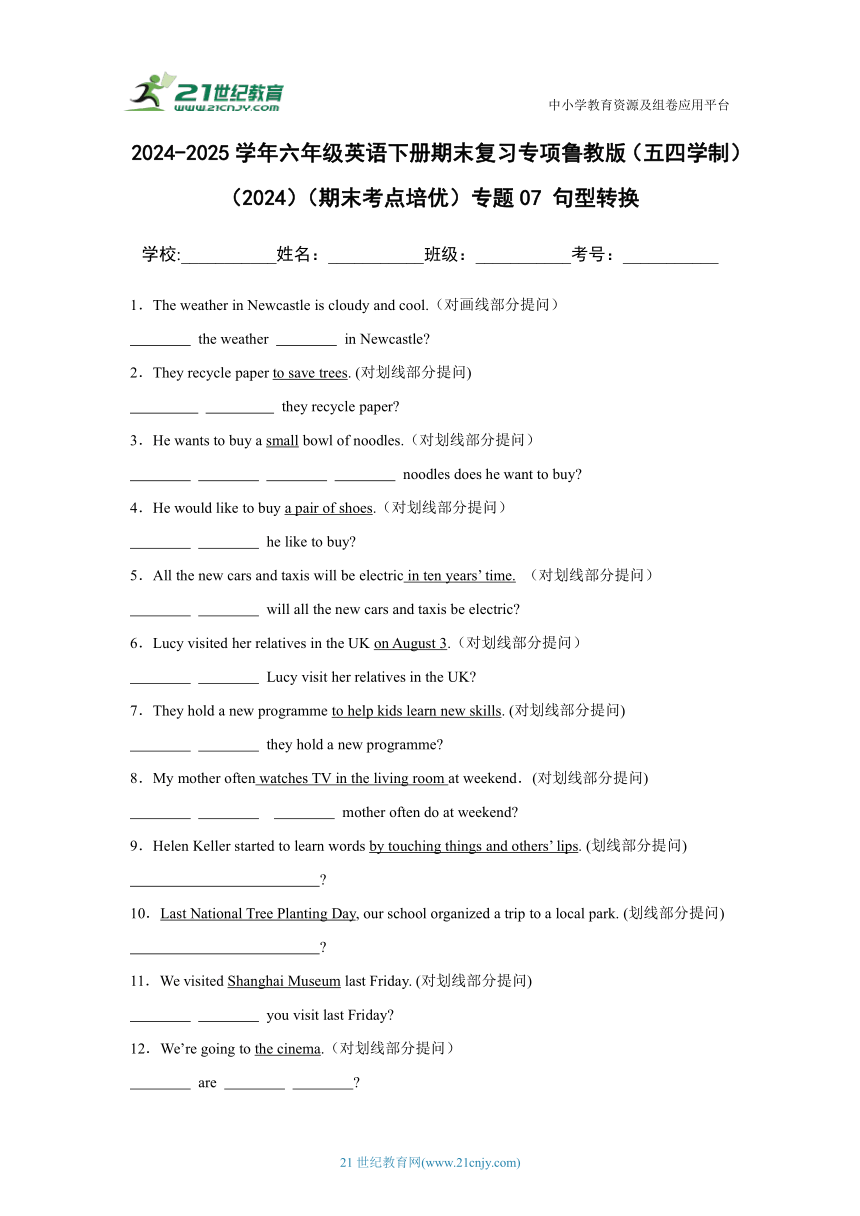 | |
| 格式 | docx | ||
| 文件大小 | 62.2KB | ||
| 资源类型 | 试卷 | ||
| 版本资源 | 鲁教版 | ||
| 科目 | 英语 | ||
| 更新时间 | 2025-06-01 09:22:55 | ||
图片预览

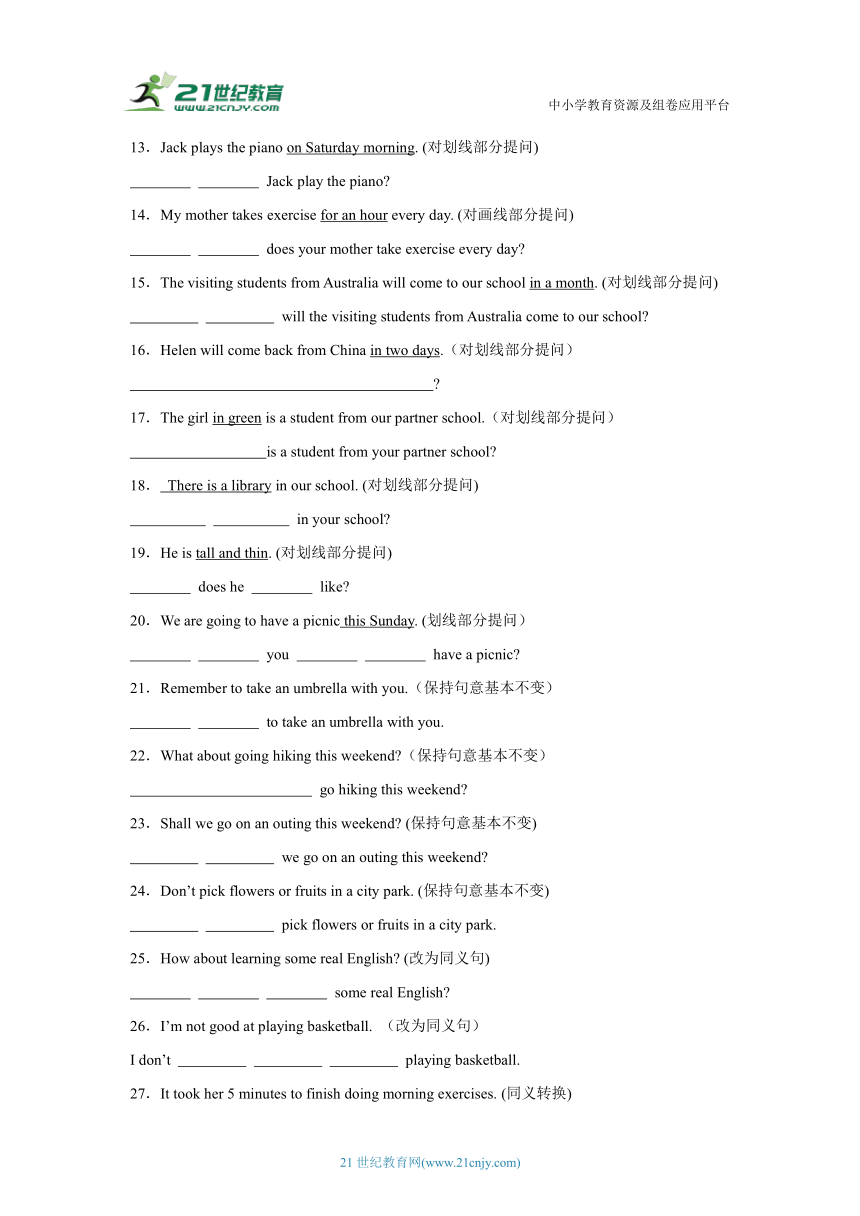
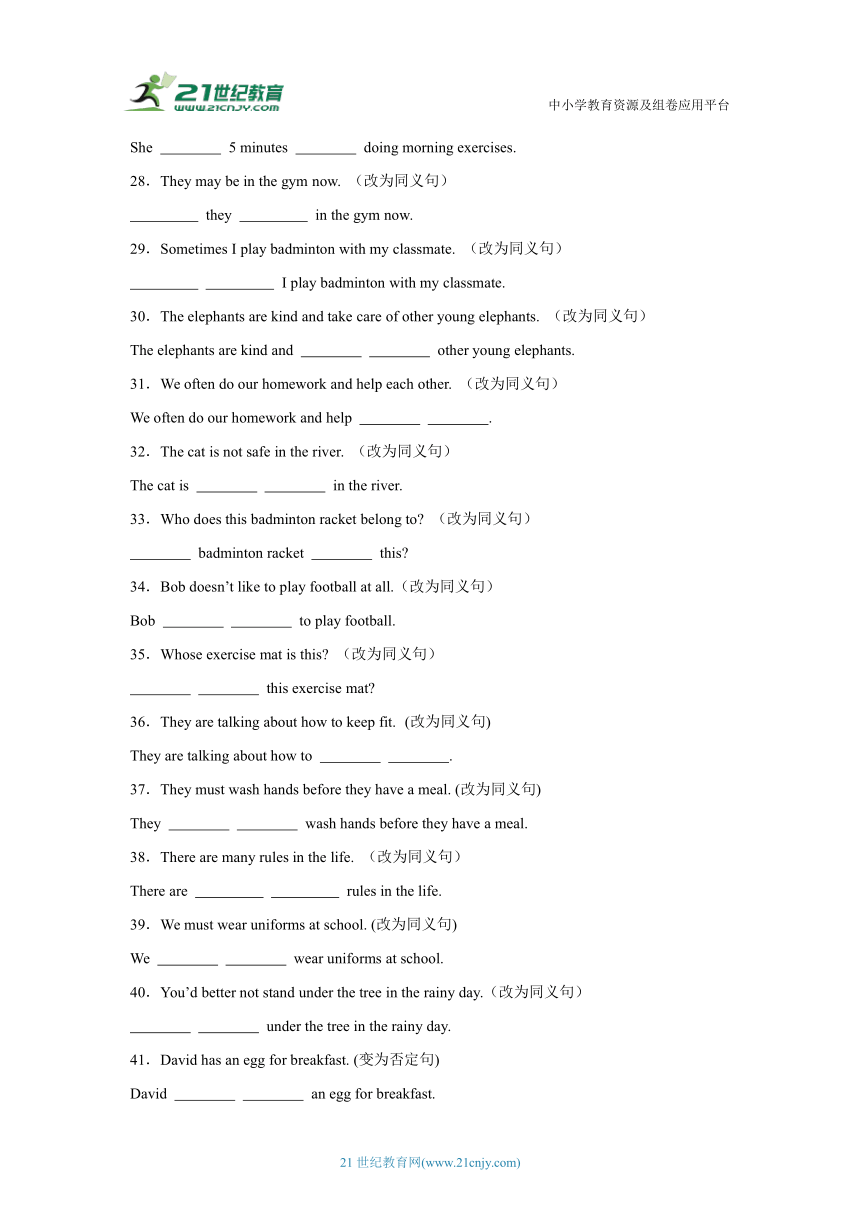
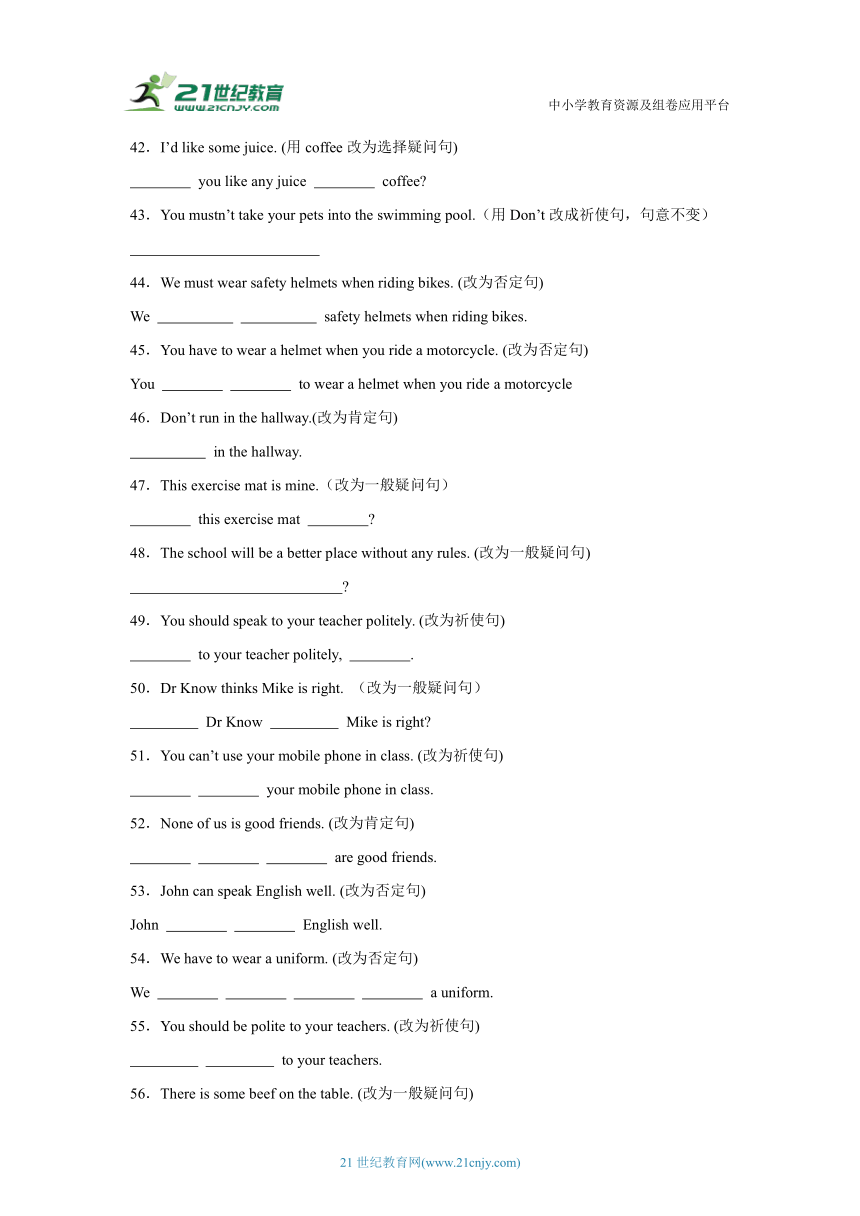
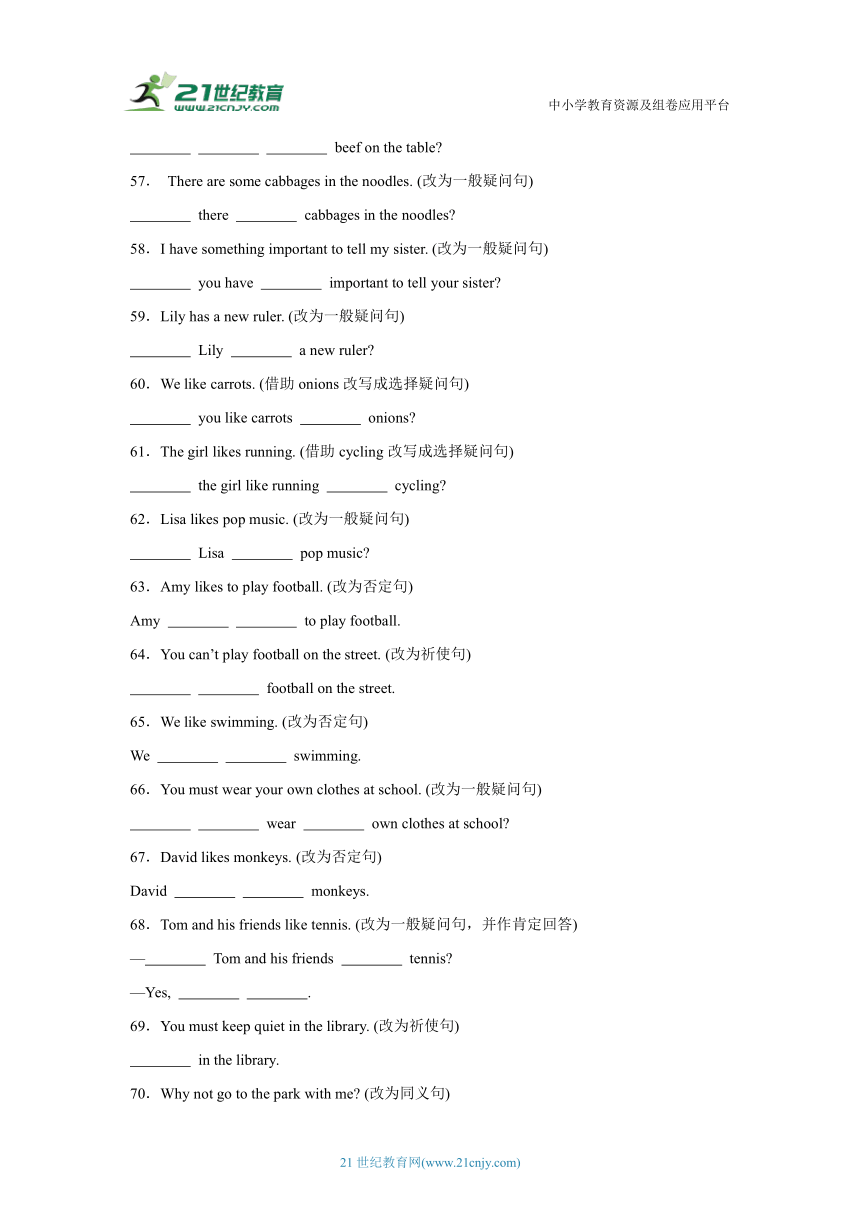
文档简介
中小学教育资源及组卷应用平台
中小学教育资源及组卷应用平台
2024-2025学年六年级英语下册期末复习专项鲁教版(五四学制)(2024)(期末考点培优)专题07 句型转换
学校:___________姓名:___________班级:___________考号:___________
1.The weather in Newcastle is cloudy and cool.(对画线部分提问)
the weather in Newcastle
2.They recycle paper to save trees. (对划线部分提问)
they recycle paper
3.He wants to buy a small bowl of noodles.(对划线部分提问)
noodles does he want to buy
4.He would like to buy a pair of shoes.(对划线部分提问)
he like to buy
5.All the new cars and taxis will be electric in ten years’ time. (对划线部分提问)
will all the new cars and taxis be electric
6.Lucy visited her relatives in the UK on August 3.(对划线部分提问)
Lucy visit her relatives in the UK
7.They hold a new programme to help kids learn new skills. (对划线部分提问)
they hold a new programme
8.My mother often watches TV in the living room at weekend.(对划线部分提问)
mother often do at weekend
9.Helen Keller started to learn words by touching things and others’ lips. (划线部分提问)
10.Last National Tree Planting Day, our school organized a trip to a local park. (划线部分提问)
11.We visited Shanghai Museum last Friday. (对划线部分提问)
you visit last Friday
12.We’re going to the cinema.(对划线部分提问)
are
13.Jack plays the piano on Saturday morning. (对划线部分提问)
Jack play the piano
14.My mother takes exercise for an hour every day. (对画线部分提问)
does your mother take exercise every day
15.The visiting students from Australia will come to our school in a month. (对划线部分提问)
will the visiting students from Australia come to our school
16.Helen will come back from China in two days.(对划线部分提问)
17.The girl in green is a student from our partner school.(对划线部分提问)
is a student from your partner school
18. There is a library in our school. (对划线部分提问)
in your school
19.He is tall and thin. (对划线部分提问)
does he like
20.We are going to have a picnic this Sunday. (划线部分提问)
you have a picnic
21.Remember to take an umbrella with you.(保持句意基本不变)
to take an umbrella with you.
22.What about going hiking this weekend (保持句意基本不变)
go hiking this weekend
23.Shall we go on an outing this weekend (保持句意基本不变)
we go on an outing this weekend
24.Don’t pick flowers or fruits in a city park. (保持句意基本不变)
pick flowers or fruits in a city park.
25.How about learning some real English (改为同义句)
some real English
26.I’m not good at playing basketball. (改为同义句)
I don’t playing basketball.
27.It took her 5 minutes to finish doing morning exercises. (同义转换)
She 5 minutes doing morning exercises.
28.They may be in the gym now. (改为同义句)
they in the gym now.
29.Sometimes I play badminton with my classmate. (改为同义句)
I play badminton with my classmate.
30.The elephants are kind and take care of other young elephants. (改为同义句)
The elephants are kind and other young elephants.
31.We often do our homework and help each other. (改为同义句)
We often do our homework and help .
32.The cat is not safe in the river. (改为同义句)
The cat is in the river.
33.Who does this badminton racket belong to (改为同义句)
badminton racket this
34.Bob doesn’t like to play football at all.(改为同义句)
Bob to play football.
35.Whose exercise mat is this (改为同义句)
this exercise mat
36.They are talking about how to keep fit. (改为同义句)
They are talking about how to .
37.They must wash hands before they have a meal. (改为同义句)
They wash hands before they have a meal.
38.There are many rules in the life. (改为同义句)
There are rules in the life.
39.We must wear uniforms at school. (改为同义句)
We wear uniforms at school.
40.You’d better not stand under the tree in the rainy day.(改为同义句)
under the tree in the rainy day.
41.David has an egg for breakfast. (变为否定句)
David an egg for breakfast.
42.I’d like some juice. (用coffee改为选择疑问句)
you like any juice coffee
43.You mustn’t take your pets into the swimming pool.(用Don’t改成祈使句,句意不变)
44.We must wear safety helmets when riding bikes. (改为否定句)
We safety helmets when riding bikes.
45.You have to wear a helmet when you ride a motorcycle. (改为否定句)
You to wear a helmet when you ride a motorcycle
46.Don’t run in the hallway.(改为肯定句)
in the hallway.
47.This exercise mat is mine.(改为一般疑问句)
this exercise mat
48.The school will be a better place without any rules. (改为一般疑问句)
49.You should speak to your teacher politely. (改为祈使句)
to your teacher politely, .
50.Dr Know thinks Mike is right. (改为一般疑问句)
Dr Know Mike is right
51.You can’t use your mobile phone in class. (改为祈使句)
your mobile phone in class.
52.None of us is good friends. (改为肯定句)
are good friends.
53.John can speak English well. (改为否定句)
John English well.
54.We have to wear a uniform. (改为否定句)
We a uniform.
55.You should be polite to your teachers. (改为祈使句)
to your teachers.
56.There is some beef on the table. (改为一般疑问句)
beef on the table
57. There are some cabbages in the noodles. (改为一般疑问句)
there cabbages in the noodles
58.I have something important to tell my sister. (改为一般疑问句)
you have important to tell your sister
59.Lily has a new ruler. (改为一般疑问句)
Lily a new ruler
60.We like carrots. (借助onions改写成选择疑问句)
you like carrots onions
61.The girl likes running. (借助cycling改写成选择疑问句)
the girl like running cycling
62.Lisa likes pop music. (改为一般疑问句)
Lisa pop music
63.Amy likes to play football. (改为否定句)
Amy to play football.
64.You can’t play football on the street. (改为祈使句)
football on the street.
65.We like swimming. (改为否定句)
We swimming.
66.You must wear your own clothes at school. (改为一般疑问句)
wear own clothes at school
67.David likes monkeys. (改为否定句)
David monkeys.
68.Tom and his friends like tennis. (改为一般疑问句,并作肯定回答)
— Tom and his friends tennis
—Yes, .
69.You must keep quiet in the library. (改为祈使句)
in the library.
70.Why not go to the park with me (改为同义句)
go to the park with me
71.The eagles have big wings. (改为一般疑问句)
the eagles big wings
72.The sharks are very scary. (改为否定句)
The sharks scary.
73.Are those bears (改为单数句)
a bear
74.We must clean the classroom every day. (改为一般疑问句)
the classroom every day
75.They usually play basketball after school. (改为否定句)
They usually basketball after school.
76.We can play basketball after school. (改为否定句)
We basketball after school.
77.He sometimes reads books in the morning. (改为一般疑问句)
he sometimes books in the morning
78.We have to wear the school uniform. (改为一般疑问句)
you to wear the school uniform
79.We should be polite to everyone. (改为祈使句)
to everyone.
80.She has a ping-pong bat. (改为否定句)
She a ping-pong bat.
中小学教育资源及组卷应用平台
中小学教育资源及组卷应用平台
21世纪教育网(www.21cnjy.com)
21世纪教育网(www.21cnjy.com)
参考答案及试题解析
1.What’s like
【解析】句意:纽卡斯尔的天气多云且凉爽。划线部分是对天气的描述,对天气提问用What’s the weather like...或How’s the weather;根据空格可知,此处应用What’s the weather like...进行提问,句子时态为一般现在时。故填What’s;like。
2.Why do
【解析】句意:他们回收纸张以保护树木。划线部分是目的状语,对此提问应用疑问词why“为什么”,句首单词首字母应大写;根据原形动词“recycle”可知,原句为含实义动词的一般现在时,主语“they”为复数,应借助助动词do构成疑问句。故填Why;do。
3.What size bowl of
【解析】句意:他想买一小碗面条。对“small”提问,是对面条的量进行提问,用“what size bowl of(多大碗尺寸/多大碗)”来提问,故填What;size;bowl;of。
4.What would
【解析】句意:他想买一双鞋子。划线部分是想买的东西,应用what提问,然后把would放在主语前。故填What;would。
5.How soon
【解析】句意:十年后,所有的新车和出租车都将是电动的。划线部分in ten years’ time,表示将来的时间,用how soon“多久之后”提问。故填How;soon。
6.When did
【解析】句意:露西于8月3日探望了她在英国的亲戚。根据划线部分“on August 3” 可知为时间状语,对具体的时间提问要用特殊疑问词 when,句首首字母w需要大写。原句是一般过去时态,疑问句的助动词是did。故填When;did。
7.Why do
【解析】句意:他们举办一个新的项目来帮助孩子们学习新技能。对“to help kids learn new skills”这一目的状语提问,也就是询问举办新项目的原因,要用疑问词“Why”。原句是一般现在时,主语是“they”,借助助动词“do”。故填Why;do。
8.What does your
【解析】句意:我的妈妈经常在周末在客厅看电视。此处询问的是具体做的事情,用What提问;主语是your mother“你的妈妈”,助动词用does。故填What;does;your。
9.How did Helen Keller start to learn words
【解析】句意:海伦·凯勒开始通过触摸事物和他人的嘴唇来学习语言。划线部分“by touching things and others’ lips”指海伦·凯勒学习的方式,对方式提问应用疑问词how,句中started为实义动词的过去式,该句为一般过去时,变特殊疑问句时,应借助助动词did,且谓语动词要变为原形。故填How did Helen Keller start to learn words。
10.When did your school organize a trip to a local park
【解析】句意:去年的全国植树日,我们学校组织了一次当地公园之旅。划线部分“Last National Tree Planting Day”表示时间,对时间提问,疑问词应用when,句子时态为一般过去时,organized“组织”为实义动词,变特殊疑问句时需要借助助动词did,第一人称our应变为第二人称your,且谓语动词应用原形。故填When did your school organize a trip to a local park。
11.What did
【解析】句意:我们上周五参观了上海博物馆。根据对“Shanghai Museum”提问,即询问上周五参观了什么,应用疑问词What。原句是一般过去时,谓语动词是visited,变为疑问句时要借助助动词did,后面的动词用原形visit。故填What;did。
12.Where you going
【解析】句意:我们要去看电影。划线部分表示地点,应该用Where提问,疑问句结构为“Where+be动词+主语+going ”,原句主语是we,疑问句中应改为you。故填Where;you;going。
13.When does
【解析】句意:杰克在周六早晨弹钢琴。根据“on Saturday morning”可知,此处是对具体时间进行提问,应用when引导特殊疑问句,句首首字母大写,时态为一般现在时,主语Jack为第三人称单数,助动词应用does。故填When;does。
14.How long
【解析】句意:我的妈妈每天锻炼一个小时。划线部分为“for an hour”,这里是提问时长,用疑问词how long来提问,主语是“your mother”,前面已经给出了助动词“does”,所以此处只需填疑问词。故填How;long。
15.How soon
【解析】句意:来自澳大利亚的访问学生将在一个月后来我们学校。此句划线部分是“in a month”,对“in+时间段”提问用疑问词how soon“多快,多久以后”。句首首字母要大写,故填How;soon。
16.How soon will Helen come back from China
【解析】句意:海伦将在两天后从中国回来。in two days“两天后”,对其提问用疑问词how soon“多久以后”提问,放在句首,字母大写;把助动词will放主语Helen之前,其余部分不变。故填How soon will Helen come back from China。
17. Which girl
【解析】句意:穿绿色衣服的女孩是我们合作学校的一个学生。对划线部分提问,划线部分为句中的定语,表示特征,应用which girl提问。故填Which girl。
18.What is
【解析】句意:在我们学校有一个图书馆。你们学校有什么?对“There is a library”提问,要用疑问词what,谓语动词用is,句首字母要大写。故填What;is。
19.What look
【解析】句意:他又高又瘦。此处询问外貌,应用“What do/does sb look like?”提问。故填What;look。
20.When are going to
【解析】句意:我们这周日要去野餐。划线部分是“this Sunday”,因此提问时应该用when;然后把句子剩余部分变为一般疑问句,即把are放在主语you之前,后面不变。故填When;are;going;to。
21.Don’t forget
【解析】句意:记得带上一把雨伞。同义句是“不要忘记带上一把雨伞”。don’t“不要”,后跟动词原形forget,表示“忘记”。故填Don’t;forget。
22.How about
【解析】句意:这个周末去远足怎么样?What about... =How about... “……怎么样呢?”。故填How about。
23.Why don’t
【解析】句意:我们这个周末去郊游好吗?根据“Shall we go on an outing this weekend ”可知,句中是用来提出建议,询问对方意见。“Why don’t we...”同样是用于提出建议,询问对方想法,与“Shall we...”意思相近,且符合句子结构。故填Why;don’t。
24.You mustn’t
【解析】句意:不要在城市的公园里摘花或果实。原句“Don’t do sth.”意为”不要做某事“,可转换为“你禁止做某事”,为“you mustn’t do sth.”。故填You;mustn’t。
25.What about learning
【解析】句意:学习一些地道的英语怎么样?how about和what about都可用于提出建议或询问情况,意为“……怎么样,……如何”,后接名词、代词或动名词形式 。故填What;about;learning。
26.do well in
【解析】句意:我不擅长打篮球。be good at“对……擅长”可以与do well in“在……方面做得好”互相替换;空前是助动词don’t,后面跟动词原形。故填do;well;in。
27.spent finishing
【解析】句意:她花了5分钟完成晨练。spend some time doing sth.“花一些时间做某事”,句子时态为一般过去时。故填spent;finishing。
28.Maybe are
【解析】句意:他们现在可能在健身房。改为同义句,空处位于句首,应用副词maybe“可能”,在句中作状语,第二空缺少be动词作谓语,时态为一般现在时,主语they为复数,be动词用are。故填Maybe;are。
29.At times
【解析】句意:有时我和同学打羽毛球。表示“有时”可用介词短语at times。故填At;times。
30.look/care after/for
【解析】句意:大象很善良,会照顾其他小象。take care of表示“照顾”,可以用短语look after或care for替换。故填look/care;after/for。
31.one another
【解析】句意:我们经常做家庭作业并且互相帮助。each other“互相”,同义词为one another。故填one;another。
32.in danger
【解析】句意:猫在河里不安全。改为同义句,可改为“猫在河里很危险”,in danger“处于危险之中”。故填in;danger。
33.Whose is
【解析】句意:这个羽毛球拍是属于谁的?根据题目要求,此句可以改成“这是谁的羽毛球拍?”whose“谁的”;is“是”,用于主语是第三人称单数的情况。故填Whose;is。
34.never likes
【解析】句意:Bob一点也不喜欢踢足球。同义句可为“Bob从不喜欢踢足球”。never“从不”,like“喜欢”,主语是第三人称单数,动词用三单形式。故填never;likes。
35.Whose is
【解析】句意:这是谁的运动垫?可以转化为“这个运动垫是谁的”。whose“谁的”;is“是”。故填Whose;is。
36.keep/stay healthy
【解析】句意:他们正在谈论如何保持健康。句中“keep fit”意为“保持健康”,也可以说“keep/stay healthy”,动词短语;空前为动词不定式符号to,这里应用动词原形。故填keep/stay;healthy。
37.have to
【解析】句意:他们必须在吃饭前洗手。改为同义句,must=have to“必须”,主语they复数,动词用原形。故填have;to。
38.lots of
【解析】句意:生活中有许多规则。表示“很多”可用结构lots of,修饰可数名词复数。故填lots;of。
39.have to
【解析】句意:我们在学校必须穿校服。根据上下句对照可知,设空处需填写must的同义表达;have to“必须,不得不”可与must互换;结合本句时态为一般现在时,主语为复数形式,所以动词用原形。故填have;to。
40.Don’t stand
【解析】句意:雨天你最好不要站在树下。此处可改为祈使句的否定形式:Don’t+动词原形,故填Don’t;stand。
41.doesn’t have
【解析】句意:David早餐吃一个鸡蛋。原句是一般现在时,主语是“David”,变否定句需要借助助动词“doesn’t”,后面的动词“has”要还原为“have”,故填doesn’t;have。
42.Would or
【解析】句意:我想要些果汁。原句“I’d like”是“I would like”的缩写,变为一般疑问句要将would提到主语之前,句首首字母大写;变为选择疑问句要用or来表示在果汁和咖啡之间的选择关系。故填Would;or。
43.Don’t take your pets into the swimming pool.
【解析】句意:你不准带宠物进入游泳池。原句“You mustn’t take…”表示禁止,改为祈使句时需用“Don’t”开头,直接表达命令或警告,其后接动词原形。“mustn’t”和“Don’t”都表示禁止或不允许。故填Don’t take your pets into the swimming pool.
44.mustn’t wear
【解析】句意:我们骑车时必须戴安全头盔。原句中“must”是情态动词,其否定形式是mustn’t,意为“禁止;不允许”。变否定句时,直接在must后加not,缩写为mustn’t,后面动词形式不变,仍用原形“wear”。故填mustn’t;wear。
45.don’t have
【解析】句意:当你骑摩托车的时候,你必须戴头盔。句子谓语部分为“have to wear”,变为否定句时,要借助助动词don’t,后接动词原形。故填don’t;have。
46.Run
【解析】句意:不要在走廊里跑。改为肯定句时,去掉否定词“Don’t”,直接用动词原形“Run”开头,构成祈使句。放在句首首字母要大写。故填Run。
47.Is yours
【解析】句意:这个运动垫是我的。改为一般疑问句时,将be动词is提前,并将名词性物主代词mine改为yours。句子开头首字母需大写。故填Is;yours。
48.Will the school be a better place without any rules
【解析】句意:没有任何规则,学校将是一个更好的地方。由于原句中的谓语动词“will be”是将来时态,因此使用助动词will引导一般疑问句,即将助动词will提到主语“The school”之前,句首首字母要大写;句子的其余部分,即“be a better place without any rules”保持不变。故填Will the school be a better place without any rules。
49.Speak please
【解析】句意:你应该礼貌地和老师说话。结合“You should speak…”可知,该句表示建议,为含有实义动词speak的肯定句,变祈使句时,应用其实义动词的原形speak引导肯定祈使句,且句首首字母大写,又结合逗号及语境可知,句末可用please表示建议或请求。故填Speak;please。
50.Does think
【解析】句意:Know博士认为Mike是对的。Dr Know是第三人称单数作主语,think是实义动词,时态是一般现在时,要用助动词does构成一般疑问句;does后接动词原形。应填Does;think。
51.Don’t use
【解析】句意:你不能在课堂上使用手机。改为祈使句,即“课堂上不能使用手机”,用结构“Don’t+动词原形”。故填Don’t;use。
52.All of us
【解析】句意:我们都不是好朋友。根据要求改为肯定句,把“None of us”变为All of us“我们所有人”,作主语,be动词用are。故填All;of;us。
53.can’t speak
【解析】句意:约翰英语说得很好。分析题干,该句为含有情态动词can的肯定句,变否定句时,直接在can后加not,缩写为can’t,其后跟动词原形。故填can’t;speak。
54.don’t have to wear
【解析】句意:我们必须穿校服。原句时态为一般现在时,主语为we,have to的否定形式为don’t have to,to后接动词原形。故填don’t;have;to;wear。
55.Be polite
【解析】句意:你应该对你的老师有礼貌。原句为肯定句,此处可改为祈使句肯定形式,以动词原形开头,be polite“有礼貌”。故填Be;polite。
56.Is there any
【解析】句意:桌子上有一些牛肉。there be句型改为一般疑问句,be动词提前,一般疑问句中用any代替some。故填Is;there;any,
57.Are any
【解析】句意:面条里有一些卷心菜。此句是there be句型,变一般疑问句时,把be动词are放句首,some变any,故填Are;any。
58.Do anything
【解析】句意:我有重要的事情要告诉我妹妹。原句是一般现在时,并含有动词have,因此一般疑问句用助动词do来提问;something在疑问句中改为anything。故填Do;anything。
59.Does have
【解析】句意:莉莉有一把新尺子。句子是一般现在时,且主语Lily是第三人称单数,句子含实义动词,变一般疑问句时,要借助助动词does,放在句首,首字母大写。原句中的动词has要变回原形have。故填Does;have。
60.Do or
【解析】句意:我们喜欢胡萝卜。原句谓语like“喜欢”为实义动词,且为动词原形,改为选择疑问句时,应借助助动词do,放置句首,首字母大写;选择疑问句是用or连接询问的两部分,以供选择。故填Do;or。
61.Does or
【解析】句意:这个女孩喜欢跑步。根据“likes”可知变疑问句时借助助动词does,选择疑问句用or连接。故填Does;or。
62.Does like
【解析】句意:Lisa喜欢流行音乐。原句中likes是实义动词的第三人称单数形式,因此改为疑问句时要借助助动词does,位于句首,首字母要大写,likes变为原形like。故填Does;like。
63.doesn’t like
【解析】句意:艾米喜欢踢足球。原句时态是一般现在时,句中还有实义动词likes,变否定句,助动词用doesn’t,谓语动词变原形。故填doesn’t;like。
64.Don’t play
【解析】句意:你不能在街上踢足球。该句要改为祈使句,应用其否定形式,以Don’t加动词原形开头,故填Don’t;play。
65.don’t like
【解析】句意:我们喜欢游泳。原句中like为实义动词,且为动词原形,因此变为否定句时要借助助动词don’t,后加动词原形。故填don’t;like。
66.Must I my
【解析】句意:你必须在学校穿自己的衣服。原句含有情态动词must,一般疑问句将must提到主语前,主语You需改为第一人称I;形容词性物主代词your需改为my。故填Must;I;my。
67.doesn’t like
【解析】句意:David喜欢猴子。该句变为否定句,句中有实义动词likes,且为第三人称单数形式,变成否定句时需要助动词的否定形式doesn’t,后接动词原形like。故填doesn’t;like。
68.Do like they do
【解析】句意:汤姆和他的朋友们喜欢网球。此句时态为一般现在时,主语“Tom and his friends”为复数,谓语动词“like”是实义动词,改为一般疑问句需要借助助动词Do;动词like用原形;肯定回答主语用they代替“Tom and his friends”,助动词用do。故填Do;like;they;do。
69.Keep quiet
【解析】句意:在图书馆你必须保持安静。原句为肯定句,变为祈使句肯定形式时,以动词原形开头,keep quiet“保持安静”,句首单词首字母需要大写,故填Keep quiet。
70.Why don’t you
【解析】句意:为什么不和我一起去公园呢?“Why not do sth.”表示建议,可转化为:Why don’t you do sth.“你为什么不……呢?”,句首单词,首字母要大写。故填Why;don’t;you。
71.Do have
【解析】句意:鹰有大翅膀。原句是一般现在时的陈述句,句子中有谓语动词have,变一般疑问用助动词Do引导,放于句首,其余部分按顺序放在Do后,句末加问号,故填Do;have。
72.aren’t very
【解析】句意:鲨鱼非常吓人。原句中有be动词“are”,改为否定句直接在“are”后加“not”,缩写为“aren’t”,“very”不变。故填aren’t;very。
73.Is that
【解析】句意:那些是熊吗?根据原句可知,Are”的单数形式是“Is”,位于句首;“those”的单数形式是“that”。故填Is;that。
74.Must we clean
【解析】句意:我们必须每天打扫教室。改为一般疑问句,应将情态动词“must”提至主语“we”前,其后接动词原形clean,且句首首字母要大写。故填Must;we;clean。
75.don’t play
【解析】句意:他们通常放学后打篮球。原句是一般现在时,主语是They,否定句助动词用don’t,后跟动词原形play。故填don’t;play。
76.can’t play
【解析】句意:放学后我们可以打篮球。改为否定句,应在情态动词“can”后加“not”,缩写形式为can’t,其后用动词原形play。故填can’t;play。
77.Does read
【解析】句意:他有时早上看书。原句时态为一般现在时,谓语为实义动词reads,且为三单形式,改为一般疑问句时,需借助助动词does,放置句首,首字母大写;主语后接动词原形read。故填Does;read。
78.Do have
【解析】句意:我们必须穿校服。原句时态是一般现在时,主语是you,需要借助助动词do来构成一般疑问句,后加动词原形have。故填Do;have。
79.Be polite
【解析】句意:我们应该对每个人都有礼貌。此处改为祈使句时,应用动词原形开头,此处强调的是“礼貌”,应用be polite“有礼貌”,位于句首的单词首字母要大写,故填Be;polite。
80.doesn’t have
【解析】句意:她有一个乒乓球拍。原句是含有实义动词has的一般现在时,主语She和谓语has都是第三人称单数形式,变否定句时需要借助助动词doesn’t,其后跟动词原形,has的动词原形为have。故填doesn’t;have。
21世纪教育网(www.21cnjy.com)
21世纪教育网(www.21cnjy.com)
中小学教育资源及组卷应用平台
2024-2025学年六年级英语下册期末复习专项鲁教版(五四学制)(2024)(期末考点培优)专题07 句型转换
学校:___________姓名:___________班级:___________考号:___________
1.The weather in Newcastle is cloudy and cool.(对画线部分提问)
the weather in Newcastle
2.They recycle paper to save trees. (对划线部分提问)
they recycle paper
3.He wants to buy a small bowl of noodles.(对划线部分提问)
noodles does he want to buy
4.He would like to buy a pair of shoes.(对划线部分提问)
he like to buy
5.All the new cars and taxis will be electric in ten years’ time. (对划线部分提问)
will all the new cars and taxis be electric
6.Lucy visited her relatives in the UK on August 3.(对划线部分提问)
Lucy visit her relatives in the UK
7.They hold a new programme to help kids learn new skills. (对划线部分提问)
they hold a new programme
8.My mother often watches TV in the living room at weekend.(对划线部分提问)
mother often do at weekend
9.Helen Keller started to learn words by touching things and others’ lips. (划线部分提问)
10.Last National Tree Planting Day, our school organized a trip to a local park. (划线部分提问)
11.We visited Shanghai Museum last Friday. (对划线部分提问)
you visit last Friday
12.We’re going to the cinema.(对划线部分提问)
are
13.Jack plays the piano on Saturday morning. (对划线部分提问)
Jack play the piano
14.My mother takes exercise for an hour every day. (对画线部分提问)
does your mother take exercise every day
15.The visiting students from Australia will come to our school in a month. (对划线部分提问)
will the visiting students from Australia come to our school
16.Helen will come back from China in two days.(对划线部分提问)
17.The girl in green is a student from our partner school.(对划线部分提问)
is a student from your partner school
18. There is a library in our school. (对划线部分提问)
in your school
19.He is tall and thin. (对划线部分提问)
does he like
20.We are going to have a picnic this Sunday. (划线部分提问)
you have a picnic
21.Remember to take an umbrella with you.(保持句意基本不变)
to take an umbrella with you.
22.What about going hiking this weekend (保持句意基本不变)
go hiking this weekend
23.Shall we go on an outing this weekend (保持句意基本不变)
we go on an outing this weekend
24.Don’t pick flowers or fruits in a city park. (保持句意基本不变)
pick flowers or fruits in a city park.
25.How about learning some real English (改为同义句)
some real English
26.I’m not good at playing basketball. (改为同义句)
I don’t playing basketball.
27.It took her 5 minutes to finish doing morning exercises. (同义转换)
She 5 minutes doing morning exercises.
28.They may be in the gym now. (改为同义句)
they in the gym now.
29.Sometimes I play badminton with my classmate. (改为同义句)
I play badminton with my classmate.
30.The elephants are kind and take care of other young elephants. (改为同义句)
The elephants are kind and other young elephants.
31.We often do our homework and help each other. (改为同义句)
We often do our homework and help .
32.The cat is not safe in the river. (改为同义句)
The cat is in the river.
33.Who does this badminton racket belong to (改为同义句)
badminton racket this
34.Bob doesn’t like to play football at all.(改为同义句)
Bob to play football.
35.Whose exercise mat is this (改为同义句)
this exercise mat
36.They are talking about how to keep fit. (改为同义句)
They are talking about how to .
37.They must wash hands before they have a meal. (改为同义句)
They wash hands before they have a meal.
38.There are many rules in the life. (改为同义句)
There are rules in the life.
39.We must wear uniforms at school. (改为同义句)
We wear uniforms at school.
40.You’d better not stand under the tree in the rainy day.(改为同义句)
under the tree in the rainy day.
41.David has an egg for breakfast. (变为否定句)
David an egg for breakfast.
42.I’d like some juice. (用coffee改为选择疑问句)
you like any juice coffee
43.You mustn’t take your pets into the swimming pool.(用Don’t改成祈使句,句意不变)
44.We must wear safety helmets when riding bikes. (改为否定句)
We safety helmets when riding bikes.
45.You have to wear a helmet when you ride a motorcycle. (改为否定句)
You to wear a helmet when you ride a motorcycle
46.Don’t run in the hallway.(改为肯定句)
in the hallway.
47.This exercise mat is mine.(改为一般疑问句)
this exercise mat
48.The school will be a better place without any rules. (改为一般疑问句)
49.You should speak to your teacher politely. (改为祈使句)
to your teacher politely, .
50.Dr Know thinks Mike is right. (改为一般疑问句)
Dr Know Mike is right
51.You can’t use your mobile phone in class. (改为祈使句)
your mobile phone in class.
52.None of us is good friends. (改为肯定句)
are good friends.
53.John can speak English well. (改为否定句)
John English well.
54.We have to wear a uniform. (改为否定句)
We a uniform.
55.You should be polite to your teachers. (改为祈使句)
to your teachers.
56.There is some beef on the table. (改为一般疑问句)
beef on the table
57. There are some cabbages in the noodles. (改为一般疑问句)
there cabbages in the noodles
58.I have something important to tell my sister. (改为一般疑问句)
you have important to tell your sister
59.Lily has a new ruler. (改为一般疑问句)
Lily a new ruler
60.We like carrots. (借助onions改写成选择疑问句)
you like carrots onions
61.The girl likes running. (借助cycling改写成选择疑问句)
the girl like running cycling
62.Lisa likes pop music. (改为一般疑问句)
Lisa pop music
63.Amy likes to play football. (改为否定句)
Amy to play football.
64.You can’t play football on the street. (改为祈使句)
football on the street.
65.We like swimming. (改为否定句)
We swimming.
66.You must wear your own clothes at school. (改为一般疑问句)
wear own clothes at school
67.David likes monkeys. (改为否定句)
David monkeys.
68.Tom and his friends like tennis. (改为一般疑问句,并作肯定回答)
— Tom and his friends tennis
—Yes, .
69.You must keep quiet in the library. (改为祈使句)
in the library.
70.Why not go to the park with me (改为同义句)
go to the park with me
71.The eagles have big wings. (改为一般疑问句)
the eagles big wings
72.The sharks are very scary. (改为否定句)
The sharks scary.
73.Are those bears (改为单数句)
a bear
74.We must clean the classroom every day. (改为一般疑问句)
the classroom every day
75.They usually play basketball after school. (改为否定句)
They usually basketball after school.
76.We can play basketball after school. (改为否定句)
We basketball after school.
77.He sometimes reads books in the morning. (改为一般疑问句)
he sometimes books in the morning
78.We have to wear the school uniform. (改为一般疑问句)
you to wear the school uniform
79.We should be polite to everyone. (改为祈使句)
to everyone.
80.She has a ping-pong bat. (改为否定句)
She a ping-pong bat.
中小学教育资源及组卷应用平台
中小学教育资源及组卷应用平台
21世纪教育网(www.21cnjy.com)
21世纪教育网(www.21cnjy.com)
参考答案及试题解析
1.What’s like
【解析】句意:纽卡斯尔的天气多云且凉爽。划线部分是对天气的描述,对天气提问用What’s the weather like...或How’s the weather;根据空格可知,此处应用What’s the weather like...进行提问,句子时态为一般现在时。故填What’s;like。
2.Why do
【解析】句意:他们回收纸张以保护树木。划线部分是目的状语,对此提问应用疑问词why“为什么”,句首单词首字母应大写;根据原形动词“recycle”可知,原句为含实义动词的一般现在时,主语“they”为复数,应借助助动词do构成疑问句。故填Why;do。
3.What size bowl of
【解析】句意:他想买一小碗面条。对“small”提问,是对面条的量进行提问,用“what size bowl of(多大碗尺寸/多大碗)”来提问,故填What;size;bowl;of。
4.What would
【解析】句意:他想买一双鞋子。划线部分是想买的东西,应用what提问,然后把would放在主语前。故填What;would。
5.How soon
【解析】句意:十年后,所有的新车和出租车都将是电动的。划线部分in ten years’ time,表示将来的时间,用how soon“多久之后”提问。故填How;soon。
6.When did
【解析】句意:露西于8月3日探望了她在英国的亲戚。根据划线部分“on August 3” 可知为时间状语,对具体的时间提问要用特殊疑问词 when,句首首字母w需要大写。原句是一般过去时态,疑问句的助动词是did。故填When;did。
7.Why do
【解析】句意:他们举办一个新的项目来帮助孩子们学习新技能。对“to help kids learn new skills”这一目的状语提问,也就是询问举办新项目的原因,要用疑问词“Why”。原句是一般现在时,主语是“they”,借助助动词“do”。故填Why;do。
8.What does your
【解析】句意:我的妈妈经常在周末在客厅看电视。此处询问的是具体做的事情,用What提问;主语是your mother“你的妈妈”,助动词用does。故填What;does;your。
9.How did Helen Keller start to learn words
【解析】句意:海伦·凯勒开始通过触摸事物和他人的嘴唇来学习语言。划线部分“by touching things and others’ lips”指海伦·凯勒学习的方式,对方式提问应用疑问词how,句中started为实义动词的过去式,该句为一般过去时,变特殊疑问句时,应借助助动词did,且谓语动词要变为原形。故填How did Helen Keller start to learn words。
10.When did your school organize a trip to a local park
【解析】句意:去年的全国植树日,我们学校组织了一次当地公园之旅。划线部分“Last National Tree Planting Day”表示时间,对时间提问,疑问词应用when,句子时态为一般过去时,organized“组织”为实义动词,变特殊疑问句时需要借助助动词did,第一人称our应变为第二人称your,且谓语动词应用原形。故填When did your school organize a trip to a local park。
11.What did
【解析】句意:我们上周五参观了上海博物馆。根据对“Shanghai Museum”提问,即询问上周五参观了什么,应用疑问词What。原句是一般过去时,谓语动词是visited,变为疑问句时要借助助动词did,后面的动词用原形visit。故填What;did。
12.Where you going
【解析】句意:我们要去看电影。划线部分表示地点,应该用Where提问,疑问句结构为“Where+be动词+主语+going ”,原句主语是we,疑问句中应改为you。故填Where;you;going。
13.When does
【解析】句意:杰克在周六早晨弹钢琴。根据“on Saturday morning”可知,此处是对具体时间进行提问,应用when引导特殊疑问句,句首首字母大写,时态为一般现在时,主语Jack为第三人称单数,助动词应用does。故填When;does。
14.How long
【解析】句意:我的妈妈每天锻炼一个小时。划线部分为“for an hour”,这里是提问时长,用疑问词how long来提问,主语是“your mother”,前面已经给出了助动词“does”,所以此处只需填疑问词。故填How;long。
15.How soon
【解析】句意:来自澳大利亚的访问学生将在一个月后来我们学校。此句划线部分是“in a month”,对“in+时间段”提问用疑问词how soon“多快,多久以后”。句首首字母要大写,故填How;soon。
16.How soon will Helen come back from China
【解析】句意:海伦将在两天后从中国回来。in two days“两天后”,对其提问用疑问词how soon“多久以后”提问,放在句首,字母大写;把助动词will放主语Helen之前,其余部分不变。故填How soon will Helen come back from China。
17. Which girl
【解析】句意:穿绿色衣服的女孩是我们合作学校的一个学生。对划线部分提问,划线部分为句中的定语,表示特征,应用which girl提问。故填Which girl。
18.What is
【解析】句意:在我们学校有一个图书馆。你们学校有什么?对“There is a library”提问,要用疑问词what,谓语动词用is,句首字母要大写。故填What;is。
19.What look
【解析】句意:他又高又瘦。此处询问外貌,应用“What do/does sb look like?”提问。故填What;look。
20.When are going to
【解析】句意:我们这周日要去野餐。划线部分是“this Sunday”,因此提问时应该用when;然后把句子剩余部分变为一般疑问句,即把are放在主语you之前,后面不变。故填When;are;going;to。
21.Don’t forget
【解析】句意:记得带上一把雨伞。同义句是“不要忘记带上一把雨伞”。don’t“不要”,后跟动词原形forget,表示“忘记”。故填Don’t;forget。
22.How about
【解析】句意:这个周末去远足怎么样?What about... =How about... “……怎么样呢?”。故填How about。
23.Why don’t
【解析】句意:我们这个周末去郊游好吗?根据“Shall we go on an outing this weekend ”可知,句中是用来提出建议,询问对方意见。“Why don’t we...”同样是用于提出建议,询问对方想法,与“Shall we...”意思相近,且符合句子结构。故填Why;don’t。
24.You mustn’t
【解析】句意:不要在城市的公园里摘花或果实。原句“Don’t do sth.”意为”不要做某事“,可转换为“你禁止做某事”,为“you mustn’t do sth.”。故填You;mustn’t。
25.What about learning
【解析】句意:学习一些地道的英语怎么样?how about和what about都可用于提出建议或询问情况,意为“……怎么样,……如何”,后接名词、代词或动名词形式 。故填What;about;learning。
26.do well in
【解析】句意:我不擅长打篮球。be good at“对……擅长”可以与do well in“在……方面做得好”互相替换;空前是助动词don’t,后面跟动词原形。故填do;well;in。
27.spent finishing
【解析】句意:她花了5分钟完成晨练。spend some time doing sth.“花一些时间做某事”,句子时态为一般过去时。故填spent;finishing。
28.Maybe are
【解析】句意:他们现在可能在健身房。改为同义句,空处位于句首,应用副词maybe“可能”,在句中作状语,第二空缺少be动词作谓语,时态为一般现在时,主语they为复数,be动词用are。故填Maybe;are。
29.At times
【解析】句意:有时我和同学打羽毛球。表示“有时”可用介词短语at times。故填At;times。
30.look/care after/for
【解析】句意:大象很善良,会照顾其他小象。take care of表示“照顾”,可以用短语look after或care for替换。故填look/care;after/for。
31.one another
【解析】句意:我们经常做家庭作业并且互相帮助。each other“互相”,同义词为one another。故填one;another。
32.in danger
【解析】句意:猫在河里不安全。改为同义句,可改为“猫在河里很危险”,in danger“处于危险之中”。故填in;danger。
33.Whose is
【解析】句意:这个羽毛球拍是属于谁的?根据题目要求,此句可以改成“这是谁的羽毛球拍?”whose“谁的”;is“是”,用于主语是第三人称单数的情况。故填Whose;is。
34.never likes
【解析】句意:Bob一点也不喜欢踢足球。同义句可为“Bob从不喜欢踢足球”。never“从不”,like“喜欢”,主语是第三人称单数,动词用三单形式。故填never;likes。
35.Whose is
【解析】句意:这是谁的运动垫?可以转化为“这个运动垫是谁的”。whose“谁的”;is“是”。故填Whose;is。
36.keep/stay healthy
【解析】句意:他们正在谈论如何保持健康。句中“keep fit”意为“保持健康”,也可以说“keep/stay healthy”,动词短语;空前为动词不定式符号to,这里应用动词原形。故填keep/stay;healthy。
37.have to
【解析】句意:他们必须在吃饭前洗手。改为同义句,must=have to“必须”,主语they复数,动词用原形。故填have;to。
38.lots of
【解析】句意:生活中有许多规则。表示“很多”可用结构lots of,修饰可数名词复数。故填lots;of。
39.have to
【解析】句意:我们在学校必须穿校服。根据上下句对照可知,设空处需填写must的同义表达;have to“必须,不得不”可与must互换;结合本句时态为一般现在时,主语为复数形式,所以动词用原形。故填have;to。
40.Don’t stand
【解析】句意:雨天你最好不要站在树下。此处可改为祈使句的否定形式:Don’t+动词原形,故填Don’t;stand。
41.doesn’t have
【解析】句意:David早餐吃一个鸡蛋。原句是一般现在时,主语是“David”,变否定句需要借助助动词“doesn’t”,后面的动词“has”要还原为“have”,故填doesn’t;have。
42.Would or
【解析】句意:我想要些果汁。原句“I’d like”是“I would like”的缩写,变为一般疑问句要将would提到主语之前,句首首字母大写;变为选择疑问句要用or来表示在果汁和咖啡之间的选择关系。故填Would;or。
43.Don’t take your pets into the swimming pool.
【解析】句意:你不准带宠物进入游泳池。原句“You mustn’t take…”表示禁止,改为祈使句时需用“Don’t”开头,直接表达命令或警告,其后接动词原形。“mustn’t”和“Don’t”都表示禁止或不允许。故填Don’t take your pets into the swimming pool.
44.mustn’t wear
【解析】句意:我们骑车时必须戴安全头盔。原句中“must”是情态动词,其否定形式是mustn’t,意为“禁止;不允许”。变否定句时,直接在must后加not,缩写为mustn’t,后面动词形式不变,仍用原形“wear”。故填mustn’t;wear。
45.don’t have
【解析】句意:当你骑摩托车的时候,你必须戴头盔。句子谓语部分为“have to wear”,变为否定句时,要借助助动词don’t,后接动词原形。故填don’t;have。
46.Run
【解析】句意:不要在走廊里跑。改为肯定句时,去掉否定词“Don’t”,直接用动词原形“Run”开头,构成祈使句。放在句首首字母要大写。故填Run。
47.Is yours
【解析】句意:这个运动垫是我的。改为一般疑问句时,将be动词is提前,并将名词性物主代词mine改为yours。句子开头首字母需大写。故填Is;yours。
48.Will the school be a better place without any rules
【解析】句意:没有任何规则,学校将是一个更好的地方。由于原句中的谓语动词“will be”是将来时态,因此使用助动词will引导一般疑问句,即将助动词will提到主语“The school”之前,句首首字母要大写;句子的其余部分,即“be a better place without any rules”保持不变。故填Will the school be a better place without any rules。
49.Speak please
【解析】句意:你应该礼貌地和老师说话。结合“You should speak…”可知,该句表示建议,为含有实义动词speak的肯定句,变祈使句时,应用其实义动词的原形speak引导肯定祈使句,且句首首字母大写,又结合逗号及语境可知,句末可用please表示建议或请求。故填Speak;please。
50.Does think
【解析】句意:Know博士认为Mike是对的。Dr Know是第三人称单数作主语,think是实义动词,时态是一般现在时,要用助动词does构成一般疑问句;does后接动词原形。应填Does;think。
51.Don’t use
【解析】句意:你不能在课堂上使用手机。改为祈使句,即“课堂上不能使用手机”,用结构“Don’t+动词原形”。故填Don’t;use。
52.All of us
【解析】句意:我们都不是好朋友。根据要求改为肯定句,把“None of us”变为All of us“我们所有人”,作主语,be动词用are。故填All;of;us。
53.can’t speak
【解析】句意:约翰英语说得很好。分析题干,该句为含有情态动词can的肯定句,变否定句时,直接在can后加not,缩写为can’t,其后跟动词原形。故填can’t;speak。
54.don’t have to wear
【解析】句意:我们必须穿校服。原句时态为一般现在时,主语为we,have to的否定形式为don’t have to,to后接动词原形。故填don’t;have;to;wear。
55.Be polite
【解析】句意:你应该对你的老师有礼貌。原句为肯定句,此处可改为祈使句肯定形式,以动词原形开头,be polite“有礼貌”。故填Be;polite。
56.Is there any
【解析】句意:桌子上有一些牛肉。there be句型改为一般疑问句,be动词提前,一般疑问句中用any代替some。故填Is;there;any,
57.Are any
【解析】句意:面条里有一些卷心菜。此句是there be句型,变一般疑问句时,把be动词are放句首,some变any,故填Are;any。
58.Do anything
【解析】句意:我有重要的事情要告诉我妹妹。原句是一般现在时,并含有动词have,因此一般疑问句用助动词do来提问;something在疑问句中改为anything。故填Do;anything。
59.Does have
【解析】句意:莉莉有一把新尺子。句子是一般现在时,且主语Lily是第三人称单数,句子含实义动词,变一般疑问句时,要借助助动词does,放在句首,首字母大写。原句中的动词has要变回原形have。故填Does;have。
60.Do or
【解析】句意:我们喜欢胡萝卜。原句谓语like“喜欢”为实义动词,且为动词原形,改为选择疑问句时,应借助助动词do,放置句首,首字母大写;选择疑问句是用or连接询问的两部分,以供选择。故填Do;or。
61.Does or
【解析】句意:这个女孩喜欢跑步。根据“likes”可知变疑问句时借助助动词does,选择疑问句用or连接。故填Does;or。
62.Does like
【解析】句意:Lisa喜欢流行音乐。原句中likes是实义动词的第三人称单数形式,因此改为疑问句时要借助助动词does,位于句首,首字母要大写,likes变为原形like。故填Does;like。
63.doesn’t like
【解析】句意:艾米喜欢踢足球。原句时态是一般现在时,句中还有实义动词likes,变否定句,助动词用doesn’t,谓语动词变原形。故填doesn’t;like。
64.Don’t play
【解析】句意:你不能在街上踢足球。该句要改为祈使句,应用其否定形式,以Don’t加动词原形开头,故填Don’t;play。
65.don’t like
【解析】句意:我们喜欢游泳。原句中like为实义动词,且为动词原形,因此变为否定句时要借助助动词don’t,后加动词原形。故填don’t;like。
66.Must I my
【解析】句意:你必须在学校穿自己的衣服。原句含有情态动词must,一般疑问句将must提到主语前,主语You需改为第一人称I;形容词性物主代词your需改为my。故填Must;I;my。
67.doesn’t like
【解析】句意:David喜欢猴子。该句变为否定句,句中有实义动词likes,且为第三人称单数形式,变成否定句时需要助动词的否定形式doesn’t,后接动词原形like。故填doesn’t;like。
68.Do like they do
【解析】句意:汤姆和他的朋友们喜欢网球。此句时态为一般现在时,主语“Tom and his friends”为复数,谓语动词“like”是实义动词,改为一般疑问句需要借助助动词Do;动词like用原形;肯定回答主语用they代替“Tom and his friends”,助动词用do。故填Do;like;they;do。
69.Keep quiet
【解析】句意:在图书馆你必须保持安静。原句为肯定句,变为祈使句肯定形式时,以动词原形开头,keep quiet“保持安静”,句首单词首字母需要大写,故填Keep quiet。
70.Why don’t you
【解析】句意:为什么不和我一起去公园呢?“Why not do sth.”表示建议,可转化为:Why don’t you do sth.“你为什么不……呢?”,句首单词,首字母要大写。故填Why;don’t;you。
71.Do have
【解析】句意:鹰有大翅膀。原句是一般现在时的陈述句,句子中有谓语动词have,变一般疑问用助动词Do引导,放于句首,其余部分按顺序放在Do后,句末加问号,故填Do;have。
72.aren’t very
【解析】句意:鲨鱼非常吓人。原句中有be动词“are”,改为否定句直接在“are”后加“not”,缩写为“aren’t”,“very”不变。故填aren’t;very。
73.Is that
【解析】句意:那些是熊吗?根据原句可知,Are”的单数形式是“Is”,位于句首;“those”的单数形式是“that”。故填Is;that。
74.Must we clean
【解析】句意:我们必须每天打扫教室。改为一般疑问句,应将情态动词“must”提至主语“we”前,其后接动词原形clean,且句首首字母要大写。故填Must;we;clean。
75.don’t play
【解析】句意:他们通常放学后打篮球。原句是一般现在时,主语是They,否定句助动词用don’t,后跟动词原形play。故填don’t;play。
76.can’t play
【解析】句意:放学后我们可以打篮球。改为否定句,应在情态动词“can”后加“not”,缩写形式为can’t,其后用动词原形play。故填can’t;play。
77.Does read
【解析】句意:他有时早上看书。原句时态为一般现在时,谓语为实义动词reads,且为三单形式,改为一般疑问句时,需借助助动词does,放置句首,首字母大写;主语后接动词原形read。故填Does;read。
78.Do have
【解析】句意:我们必须穿校服。原句时态是一般现在时,主语是you,需要借助助动词do来构成一般疑问句,后加动词原形have。故填Do;have。
79.Be polite
【解析】句意:我们应该对每个人都有礼貌。此处改为祈使句时,应用动词原形开头,此处强调的是“礼貌”,应用be polite“有礼貌”,位于句首的单词首字母要大写,故填Be;polite。
80.doesn’t have
【解析】句意:她有一个乒乓球拍。原句是含有实义动词has的一般现在时,主语She和谓语has都是第三人称单数形式,变否定句时需要借助助动词doesn’t,其后跟动词原形,has的动词原形为have。故填doesn’t;have。
21世纪教育网(www.21cnjy.com)
21世纪教育网(www.21cnjy.com)
同课章节目录
